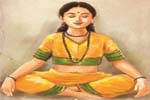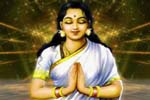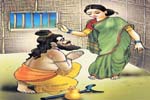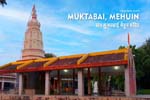
Muktabai
Muktabai is a much revered name in the Warkari sect which is a Bhakti tradition prevalent in Maharashtra, initiated by the renowned Sant Gyaneshwar. The followers of this tradition primarily worship Lord Vitthal in Pandharpur. Devotees fondly refer to her as Muktai, ‘ai’ means mother. Owing to her extraordinary life, she is considered an incarnation of the AdiShakti.
Early Life
Muktabai was born in 1277 (or 1279) in Apegaon village near Paithan. Her parents were Vitthal Kulkarni and Rukmini. She was the youngest of their four children, the elder three being Gyaneshwar, Nivruttinath and Sopan. All four of them were born to spread the magic of devotion and spirituality in the world.
Vitthal Kulkarni left his homely life early and got initiated as a renunciate in Varanasi. However, when his guru found that he had a young wife, he ordered Vitthal to return and fulfill his duties towards his family. Vitthal was a learned man, and he taught the Vedas and other scriptures to his sagacious children. When the entire family was on pilgrimage to Traymbakeshwar, the 10 year old Nivrutti was initiated into the Nath tradition. Nivrutti’s great grandfather was also a saint of the Nath tradition. Later, Nivruttinath himself initiated his siblings.
Returning to household after renunciation is looked down upon. So, Vitthal and his family had to face ostracization. As an attempt towards repentance, Vitthal and Rukmini took jalsamadhi in Prayag, thinking that this might end their children’s social expungement. The kids were left to fend for themselves.
Muktabai’s spiritual stature is revealed
When the orphaned kids returned to Paithan, they had to depend on alms for survival. But in due time, the villagers were impressed by their knowledge of the Vedas and their spiritual luminescence. Several incidents attested to their greatness –
Visoba ‘Khechar’
One night, Gyaneshwar expressed to Muktabai his wish to eat bun. A frying pan was needed to cook it and they didn’t have one. So Mukta went door to door asking for a frying pan, but nobody helped her. A villager named Visoba Chati also refused her, and out of curiosity, followed her home. Seeing Mukta dejected, Gyaneshwar was much moved. He asked his sister to prepare the flour, and then he held out his palm which was heated red like an oven. Mukta happily cooked the buns. Visoba Chati was beyond amazed. He plunged the door open and fell at the children’s feet. Muktabai admonished him, called him a ‘khechar’ (ass), and asked him to get lost. After his repeated pleas for forgiveness, Gyaneshwar relented and asked Muktabai to be his Guru. This Visoba Khechar later became the guru of the renowned Bhakti saint Namdev.
Changdev
After some other miraculous incidents, the fame of these children spread far. Changdev was an adept yoga practitioner and he did not like to hear people praise them. In order to impress his superiority over them, he rode to them on a tiger, with a cobra wrapped around his neck, and a large procession of amazed people. When the siblings came to know of this they were sitting on a short wall. They simply patted the wall and it started flying, and in this manner they received Changdev who was humbled.
It took another couple of incidents for Changdev to accept Muktai as his guru. Some people fetched a man’s body to Changdev’s ashram in hope that he could bring him back to life. While they were conversing, Muktabai appeared there. As soon as she touched the body, the man was alive again. Changdev was astonished and Muktabai had disappeared. In another incident, once when passing by the siblings’ ashram, he gazed at them. A fully clothed Muktabai appeared naked to him, and he turned the other way. Muktabai then pointed out the shortcoming in his spiritual quest that he was still bound by societal notions of body and shame, and that he must endeavor to see God in every being. After this incident, at Gyaneshwar’s advice, Changdev requested her to be his guru.
Mahasamadhi
After Sant Gyaneshwar and Sant Sopandev had concluded their divine play at Alandi and Saswad respectively, Nivruttinath took his sister on pilgrimage to Tryambakeshwar. They were on the bank of river Tapi when thunderstorm broke out, lightning struck, and Muktabai was apparently lost in the flooded river. The place is marked at Mehun in Jalgaon. The temple is now submerged under water. A new temple has been erected near Someshwar temple there. Nivruttinath chose Tryambaeshwar as his last resting place soon after.
Abhang
‘Abhang’ literally means that which is unbroken, or continuous. It is a form of devotional hymn written in Marathi which can be sung by anybody. Sant Gyaneshwar pioneered it so that deep spiritual knowledge could be made available for the masses in vernacular which they can easily understand. Abhang are usually chanted out loud. Groups on pilgrimage to Pandharpur sing abhangas.
A total of 41 Abhang are attributed to Muktabai. The famous ‘Tattvasar abhang’ was created by Changdev by her order. Her works convey the highest of philosophy in simplest terms. For instance, one of her abhang goes-
Where darkness is gone I live, where I am happy. I am not troubled by coming and going, I am beyond all vision, above all spheres. His spirit lives in my soul Mukta says: He is my heart’s only home!
One of Muktabai’s most famous abhang is ‘Tatiche abhang’. Fed up of hearing baseless snide remarks from people, Sant Gyaneshwar locked himself in a room. Muktabai then placated him through this abhang, asking him to open the door. One portion of it is-
Yogi pavan manach sahi apradh zanacha vishwa rage zhale vanhi santi sukhe vhave pani shabdashastre zhale klesh santi manava updesh vishwapash brahma dora tati ughda Gyaneshwara The yogi must bear the faults of people with a calm mind If the world becomes like fire, the saint douses it with love Words can hurt like weapons, but the saint’s words are to teach World is cloth and Brahma its thread, Open the door Gyaneshwara!



